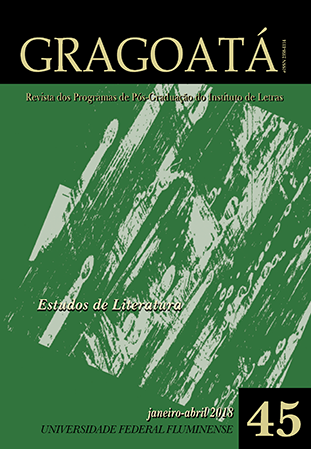'Amerika' by Franz Kafka: from father to son
DOI:
https://doi.org/10.22409/gragoata.v23i45.33565Keywords:
Franz Kafka, Jacques Derrida, Jacques Ranciére, Paternal law, democracy.Abstract
This article analyzes the novel Amerika: the missing person, by Franz Kafka, the configuration of paternal law as an oppressive system that judges and sentences the son according to a predefined concept law, which turns this judgment into a fiction. Two democratic territories, a utopian and a real one, that are presented as a scenery of the judgment, as also as, the punishment of the son. In the face of father’s law, the son has no possibilities of choice, because he is already entangled in the original sin that has sentenced him as guilty before his own existence. In the development of this article, three narratives of Kafka are presented like exercises of reflection about this autocratic paternal law such as: The metamorphosis, The judgement and Letter to my father. Texts from Jacques Derrida, “Préjugés: devant la loi” and from Jacques Rancière, “O continente democrático”, which give this article a theorical framework from which Kafka’s paternal law can be thought.
---
Downloads
Downloads
Published
How to Cite
Issue
Section
License
Authors who publish in Gragoatá agree to the following terms:
The authors retain the rights and give the journal the right to the first publication, simultaneously subject to a Creative Commons license CC-BY-NC 4.0, which allows sharing by third parties with due mention to the author and the first publication by Gragoatá.
Authors may enter into additional and separate contractual arrangements for the non-exclusive distribution of the published version of the work (for example, posting it in an institutional repository or publishing it in a book), with recognition of its initial publication in Gragoatá.

Gragoatá is licensed under a Creative Commons - Attribution-NonCommercial 4.0 International.











